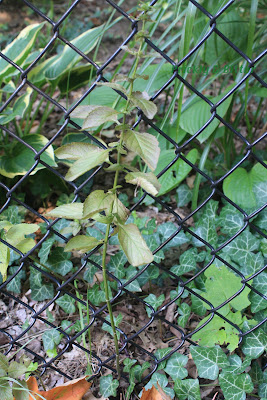Tuesday, September 18, 2012
The healing powers of wild mint
Species name: Mentha arvensis
Common name: wild mint
Location: Ontario
Imagine my surprise when I find out that not only does this look like mint, it actually is mint! All this time, my mom and I had been buying mint in small pots from the gardening centre to put in planters on our back patio for the summer to make beverages (usually ending up in a Mojito; a traditional drink from Cuba involving mint and lime muddled with sugar, a dash of bitters, then topped up with soda water. If you want to feel "truly Cuban" you an add a good dash of aged rum). Little did we know that we could just raid the neighbour's garden without paying a cent. Perhaps we might even ask to use it first, but it's not like they'd notice it was even gone. The genus Mentha in general is incredibly invasive no matter what habitat it's in; it doesn't have to be a non-native habitat to become a weed (as evidenced by this species: native to southeastern Canada and northeastern United States, and invasive across all of its native range and in Europe, Asia and Australia where it has been introduced). The same invasive habit can be found with spearmint (M. spicata; native to Europe), water mint (M. aquatica; native to Europe, northwest Africa and southwest Asia), European horsemint (M. longifolia; native to Europe and western and central Asia), curled mint (M. crispa; native to Europe and northern Africa) and peppermint (M. piperita; native to Europe). Imagine my second round of surprise to learn that the species in my neighbour's back yard is the native wild mint! Now I can drink mojitos knowing I'm helping clear the weeds from mine and my neighbours' gardens (it feels like the plants grow back as fast as I can use them) and consuming locally-grown, native crops while I'm at it. Now if only I can find a way to domesticate a new species of cold-tolerant limes in Canada, I'll be all set.
Since this species of mint actually has what we call a "circumboreal distribution," meaning it's native range is in Asia, Europe and North America, the traditional use of this plant is spread across many different cultures around the world. The wild mint plant, most important by far to Hindus in India (they refer to it as "Podina"), is most notably used as a medicinal plant after its important culinary use. The menthol in the leaves, a kind of plant-based alcohol, has reported healing powers for many different ailments including headaches, nausea, vomiting, stomach upset, diarrhea, muscle pain, rhinitis, sore throat, and colic in babies. It also has reported effects with decreasing inflammation and acting as an antibiotic when applied on the skin. It can also relieve the itch associated with rashes and insect bites and stings, as well as treat swollen gums and mouth ulcers. That's a whole lot of use for one little plant!
Do any of these reported treatments actually work? Certainly it provides some relief for any kind of ache or pain, due to the cooling sensation of the menthol. Can it actually reduce swelling? I've never noticed pure menthol extract (either suspended in a gel or a cream) to be particularly effective at reducing swelling associated with muscle or bone injury but the feeling associated with the cooling menthol at the very least acts as an excellent placebo. It also absolutely does relieve itching due to that same cooling feeling. When menthol enters the digestive tract it helps the body with digesting food, so it can play a role in relieving indigestion and helping with other digestive issues. In fact, there was a study in 2007 published in the journal "Digestive and Liver Disease" that noted that in people with Irritable Bowel Syndrome (IBS), ingesting mint oil (usually in the form of peppermint oil, but could be any oil with high levels of menthol and menthone) three times a day can have a major reduction in symptoms associated with IBS in as many as 75% of all people tested! The results were confirmed in another study in 2008, and this is currently being worked on by a lab in Italy as a viable treatment option for those suffering from IBS.
Subscribe to:
Post Comments (Atom)




No comments:
Post a Comment